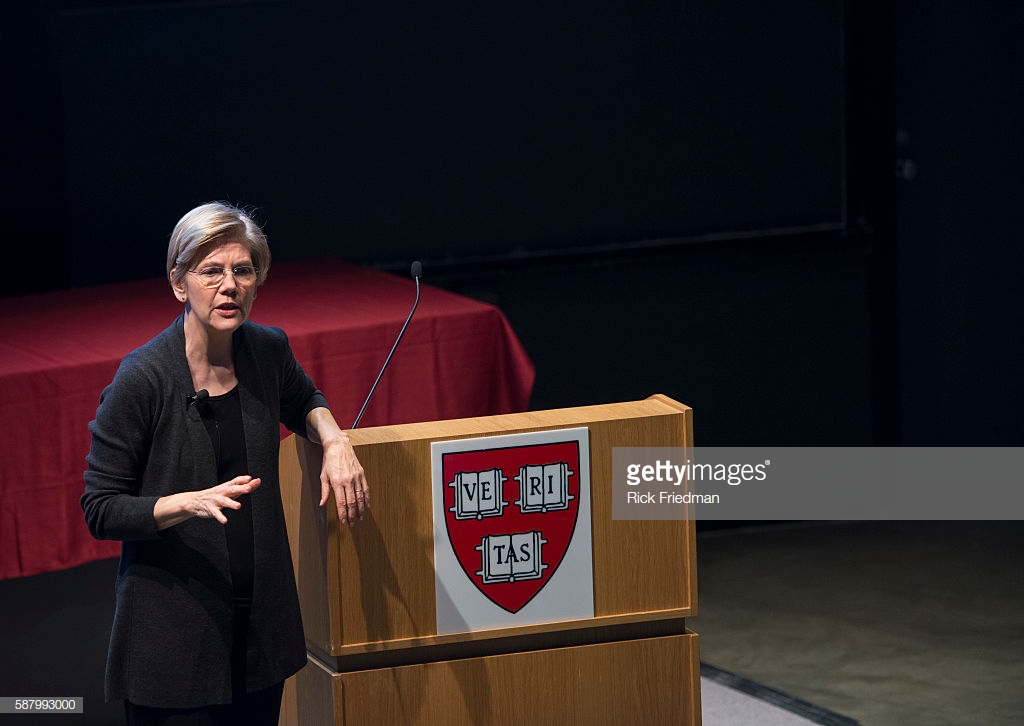Harvard imposed quotas on Jews for decades. And the university didn’t go co-ed until 1977,
making it the second to last of the ivies to hold out against admitting women. Earlier, the school had an unfortunate connection to slavery.
But despite Harvard’s apparent modern-day obsession with political correctness, you won’t find any statues or monuments commemorating the victims of those parts of the school’s otherwise-celebrated past on its 5,076-acre campus in historic Cambridge, Massachusetts. Perhaps the university’s administration figures that some things are better off left quietly forgotten and indeed, it’s not hard to imagine that one day not too long from now there will instead be many oversized bronzed renditions of Elizabeth Warren placed there first.
Meanwhile though, against this backdrop a group called Students for Fair Admissions has brought a federal class action lawsuit against Harvard claiming that the premier ivy league university discriminates against Asian applicants. That case is now unfurling in a Boston courthouse. Perhaps ironically however, before The Honorable Allison D. Burroughs was appointed to the federal bench by Harvard Law grad Barack Obama and before she was then randomly assigned to try the case against his alma mater, she too received a rejection letter from the school. Instead she went to its fellow ivy league competitor, the University of Pennsylvania.
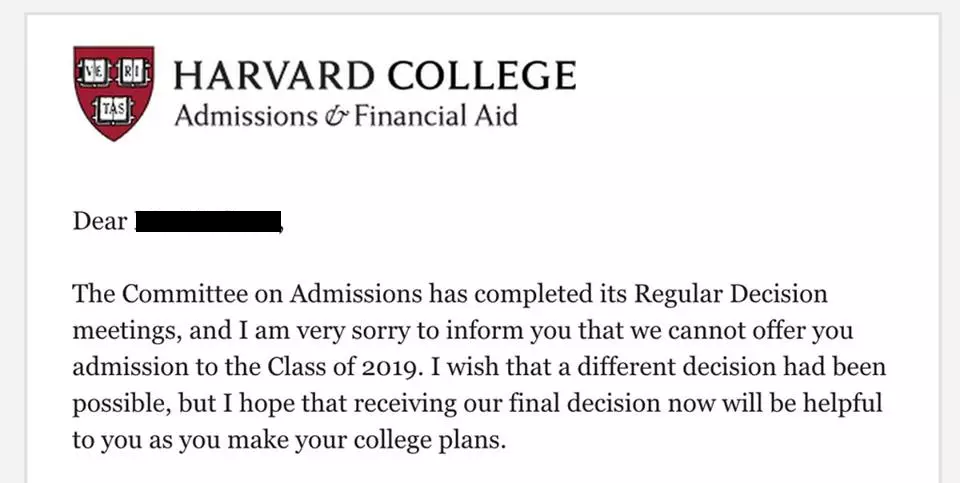
Judge Burroughs received a rejection letter like this one before attending the University of Pennsylvania Law School then being nominated to the Bench by Harvard alum Barak Obama.
So, one may reasonably wonder, was Judge Burroughs personally affected by race-based admissions policies at Harvard or elsewhere?
And pondering the self-inflicted revelations regarding Elizabeth Warren’s claim of Native American ancestry last week, one might also wonder, would Judge Burroughs and the dozens of Asian applicants who are now suing the senator’s former employer for discrimination have fared any better with Harvard if they too had self-identified as Native American? Indeed, Harvard's past rejection of Burroughs - which 2 years ago drew a humorous musing from her bench during a pre-trial conference - more recently garnered significant and serious attention at a sidebar during the trial.
At issue in the case is Harvard’s use of a subjective so-called “personality test” as part of its admissions criteria. The plaintiffs allege that the school uses that test as a front to hide what is really an ethnic quota, i.e.: an unlawful limit on the number of applicants from Asian backgrounds that the university accepts.
They say that Harvard consistently scores Asian applicants lower on that test.
And in a competition dominated by numbers which come from outside of Harvard and which lend themselves to objective comparisons, like SAT scores, GPAs, and AP credits, it’s not hard to see how any internal and subjective assessment could be used to manipulate the demographics of the incoming class. In fact, it’s hard to imagine any other instrument by which a school could exercise such control along racial lines without plainly admitting that it was doing so.
Further, in this particular instance, given some of the unfortunate and untrue racial stereotypes against Asians, choosing to call such an instrument a “personality test” and then giving Asian applicants low scores on it could be considered particularly insensitive, if not outright callous and insulting, especially coming from an institution like Harvard which otherwise makes such a proud and public display of its diversity and sensitivity.
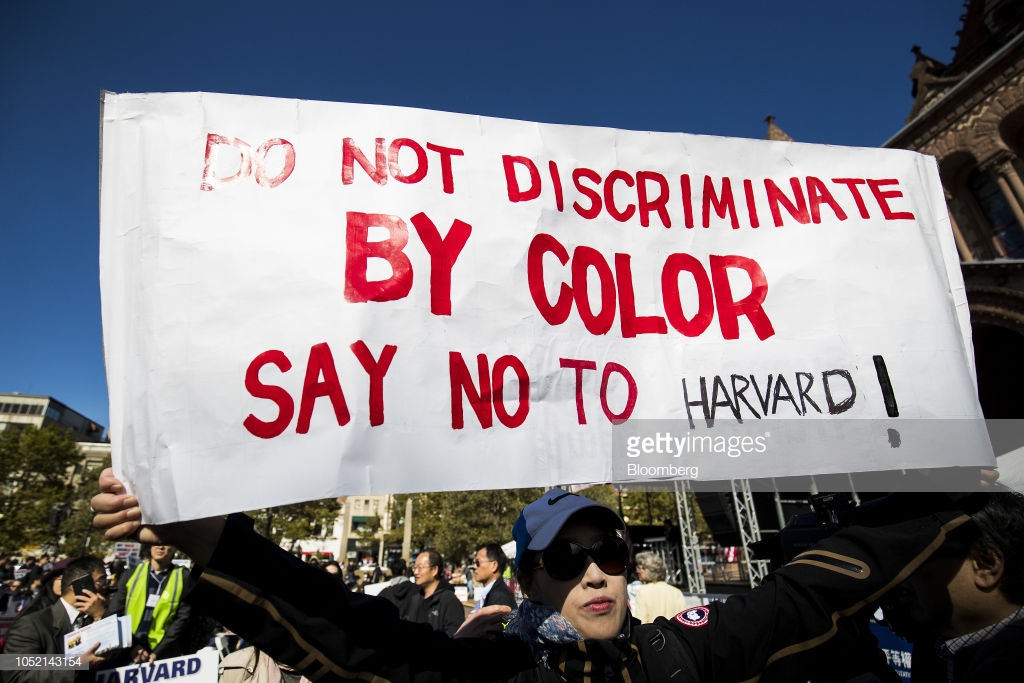
A protestor holds a sign criticizing the university, “Do Not Discriminate By Color Say No To Harvard” in Boston on October 14th. (Adam Glanzman/Getty Images)
Also, other aspects of the case aren’t without their own seemingly savage ironies either. Indeed, in this matter concerned with allegations of unacceptable biases at Harvard, the potential favoritism shown to the university by the previous Justice Department while it was under the control of Harvard alums Barak Obama and Loretta Lynch – and when it refused to join the anti-discrimination suit against their alma mater – has itself been a topic on inquiry during the Trump administration. The question now seems to be, would the feds have acted differently during the last administration if these same allegations had been brought against a competing university, i.e.: would the plaintiffs from such a theoretically similar lawsuit have also had go it alone in federal court without Uncle Sam?
Of course, there’s no way to know for sure, but there is other data which perhaps suggests an answer.
Now obviously, the top federal prosecutor in Boston when Students for Fair Admissions filed its complaint against Harvard in 2014 was appointed by Harvard Law grad Barack Obama. Her name was Carmen Ortiz, and Obama chose her based on the fervent recommendation of Elizabeth Warren’s predecessor in the Senate, Ted Kennedy - of the “Harvard Kennedy School” Kennedys. Yes, those Kennedys.
Ultimately, the decision as to whether or not the feds would join the anti-discrimination suit against Harvard was largely if not entirely up to Ortiz. And with Ortiz in the U.S. attorney’s office, even her newly-created civil rights division left Harvard alone while instead targeting others. Then after Ortiz had left her position under embarrassing circumstances in December 2016 (and after she left one of Rod Rosenstein’s Harvard alums in her stead as Boston’s acting U.S. attorney), Ortiz tried to get a job at Harvard herself.
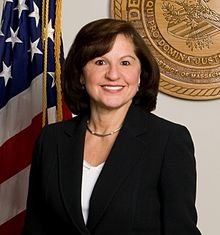
Former U.S. Attorney Carmen Ortiz, who apparently chose not to join a discrimination lawsuit against Harvard. (Public Domain)
Now, that didn’t end up working out for Ortiz, who is after all one of the only Obama appointees to ever have the Huffington Post go after her. Indeed, Ortiz has so many skeletons in her closet that around this time of the year they set up a Secret Santa. Further, she became notorious in Boston for craving the spotlight. So, it seems likely that if Superman had come to town while Ortiz was a prosecutor, then she probably would have gotten jealous, had him arrested for violating FAA regulations, then held him without bail as a flight risk, before finally deporting him in kryptonite handcuffs for illegal immigration.
Regardless though, it does appear that Ortiz made a concerted effort not to ruffle feathers at Harvard. Besides the anti-discrimination suit, both she and her successor also opted not to join a Medicare/Medicaid fraud tort against Harvard’s largest teaching hospital. Nor did they seem to do anything during the national controversy surrounding the alleged violation of Justina Pelletier’s civil rights by Harvard’s primary pediatric affiliate - Boston Children’s Hospital.
So, there is indeed a long line of Americans who have had to go it alone in federal court against powerful Harvard institutions, apparently because the DOJ is prejudiced against those who go up against Harvard.
All of this begs the question, were these plaintiffs penalized for their integrity rather than rewarded for it - while in contrast did Warren and the rest of Harvard use prejudice for their own benefit to skirt the law based on their membership in the university’s elite, powerful, and far-reaching community. And, given that these plaintiffs might not have gotten into the school because they were honest about their ethnicities, is this perhaps the true face of Harvard’s racism?
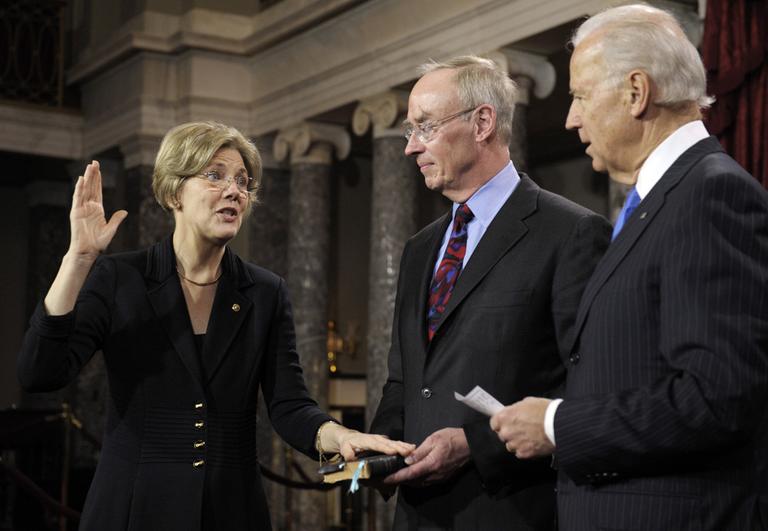
(Chip Somodevilla/Getty Images)
Martin Gottesfeld is an imprisoned human rights activist facing up to 15 years under the CFAA for helping save Justina Pelletier while she was under the care of Harvard-affiliated Boston Children's Hospital physicians. The prosecution of his case was started under the tenure of former U.S. Attorney Carmen Ortiz. To learn more about him or donate to support him, please see FreeMartyG.com.

 Donate Now
Donate Now
 Follow
Follow 